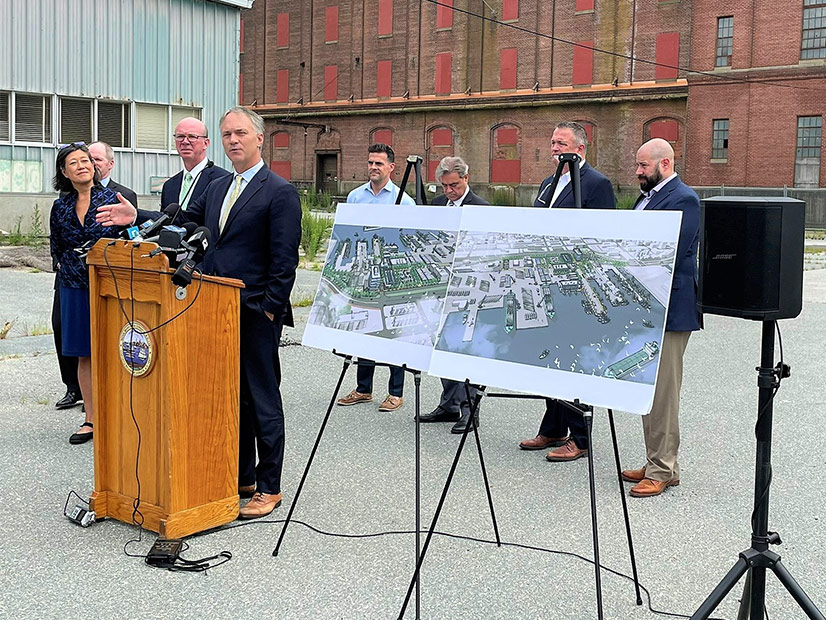Some New England states are prioritizing climate and energy in their spending plans for federal aid targeted at recovery efforts from the COVID-19 pandemic.
Vermont and Maine leaders have approved $136 million for climate and energy initiatives, and Massachusetts Gov. Charlie Baker wants to spend $400 million on those sectors.
Baker told legislators on Tuesday that he wants to put some of the state’s American Rescue Plan Act (ARPA) funding to work immediately for energy and mitigation measures.
“To support economic development in the offshore wind industry, our [COVID recovery bill (H.3922)] includes $100 million for marine port development,” Baker said in testimony during a Joint Committee on Ways and Means hearing. “Funding would be used to rehabilitate or expand port areas across the commonwealth, particularly those in environmental justice communities, including places like New Bedford, Salem and Somerset.”
Baker introduced the bill at the end of June, and it is now before the Ways and Means committee.
The bill sets out investments for $2.9 billion in federal aid to support economic recovery from the pandemic in the state, leaving an additional $2 billion for allocation in the future.
OSW funding under the bill would support port area improvements or operations and maintenance of facilities where it would promote economic development.
Port improvements could include “projects that would expand the acreage of facilities, reinforce structures, harden storage and laydown areas, and dredge for increased site access,” Michael Heffernan, secretary of the Office of Administration and Finance, said in his testimony.
New Bedford is a hotbed of OSW port activity, most recently seeing its port capacity for project staging doubled through a redevelopment plan with Eversource Energy. The city, which is the sixth largest in the state, has 62 out of a total 87 census blocks that meet the definition of an environmental justice community, according to the Conservation Law Foundation.
Residents of the city stand to benefit from the first project labor agreement for utility-scale OSW, which Vineyard Wind and the Southeastern Massachusetts Building Trades Council announced in New Bedford last week. The deal includes terms to ensure that the workforce comes from the counties of Plymouth, Barnstable, Duke and Bristol, the last of which being where New Bedford is located.
Resilience Measures
The OSW fund is part of $1 billion in ARPA funding Baker wants to put into infrastructure investments across the state.
That package includes $300 million to support resilience and adaptation measures necessary to combat the effects of climate change.
“This funding would be distributed through programs like the Municipal Vulnerability Preparedness program, the Coastal Resilience grant program, and the existing land conservation and parks programs under the Resilient Lands Initiative,” he said.
The Resilient Lands Initiative focuses on, among other things, increasing carbon storage and climate resilience in forests, wetlands and soils.
“These programs have been blessed by the legislature and have proven their worth,” Baker said. “This funding could replace failing municipal culverts and coastal infrastructure across the commonwealth, which has been clearly unable to deal with the rainfall that we’ve seen over the course of the past several months.”
Maine and Vermont
Maine Gov. Janet Mills signed a bill on Monday authorizing about $1 billion in ARPA funding for the state and carving out $76 million through 2023 for climate- and energy-related initiatives.
“The Maine Jobs and Recovery Plan — modeled on the advice of experts, backed by a wide coalition of organizations and supported by funding from the American Rescue Plan — is likely the most transformational proposal of our lifetimes,” Mills said upon signing the bill (LD 1733).
The spending plan includes a $50 million fund for Efficiency Maine Trust to accelerate home weatherization and efficiency upgrades. Initiatives that build GHG emission-reduction strategies for industrial facilities would qualify under the fund. The trust also will help administer an $8 million fund to expand state, municipal and publicly accessible electric vehicle charging infrastructure.
An additional $5 million will support clean energy workforce development programs, and $2.5 million will help establish a clean energy innovation program.
The governor’s Energy Office will help administer an $8 million fund to support electric grid upgrades that directly benefit businesses in areas hit hardest by the pandemic. And $3 million will support research and policy initiatives related to fisheries and OSW development.
In Vermont, Gov. Phil Scott signed a state budget in June that allocated about $250 million in ARPA and general funds for climate change and mitigation measures over the next three years. About $60 million of federal aid will go to home weatherization, energy efficiency, and clean energy workforce and renewable energy development. (See Vt. Governor Signs State Budget with $250M for Climate Mitigation.)



